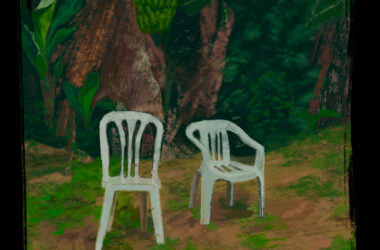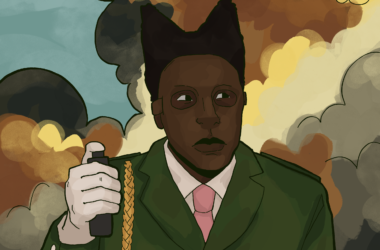On Jan. 19, the McGill English Department held its 2022 Spector Lecture, an annual event that highlights contemporary work in the literary field. This year, the department welcomed Jeff Dolven, a poet, literary critic, and Princeton professor of English. Later, students and faculty had a chance to hear several of his new poems at a virtual reading hosted by Poetry Matters on Jan. 20. Originally planned to take place in McGill’s Wilson Hall on Mar. 24, 2020, organizers moved the lecture online after the pandemic prompted numerous reschedulings.
To start it off, Dolven introduced attendees to his most recent area of study: Poetry and simultaneity. Dolven explored how human conversation is naturally inclined toward turn-taking—a tendency that poetic structure can disrupt to create metaphors that form overlapping connections.
Dolven then explained the importance of taking turns during conversation. No known human language prefers both parties to speak simultaneously during a conversation; overlapping speech often leaves us disoriented and overwhelmed. However, English poet Sir Philip Sidney’s double-sestina poem “Ye Goat-Herd Gods”—Dolven’s case study for the lecture—challenges this inherently human pattern. As the two speakers, shepherds Strephon and Klaius, lament their love for an ambiguous and distant feminine figure, the poem begins to abandon the typical back-and-forth of human speech until the shepherds’ duet loses all essence of natural human behavior. While Strephon begins wailing “For she whose parts maintained a perfect music,” Klauis follows, echoing “For she, with whom compared, the Alps are valleys,” emphasizing the heavily formulated, yet related nature of their cries. With stark shifts between each shepherd’s longing confessions, Strephon’s and Klaius’ proclamations appear in sync, yet disconnected.
Dolven highlighted that the shepherds repeatedly echo each other’s form, rhetoric, and figurative language, imbuing metaphors and figures of speech with multiple “stacked” meanings. Though literary theorists commonly argue that metaphors link, or condense, two disparate objects together through speech, Dolven argues that this constant echoing and build-up of multiple meanings deconstructs the metaphor’s linear connections, instead fusing them into a web of multiple meanings.
A recording of the lecture will be available soon on the Poetry Matters website, and Dolven intends to elaborate on these ideas as well as others in his upcoming project exploring poetry and simultaneity, tentatively titled All Together Now.
In addition to being a prominent literary theorist and critic, Dolven also writes poetry. His works have been featured in The New Yorker and/The Paris Review, and he also edits for Cabinet Magazine. Dolven’s poetry reading, focussing on attention and solidarity, was an effective counterpart to his denser, more theoretical lecture the day before.
Discussing his forthcoming poetry collection, A New English Grammar, and Other Poems, Dolven explained his formula: Each poem begins with a grammar rule copied from a textbook, which he proceeds to break in the poem’s following lines. The rules encourage him to play with fun phrases that may make grammar purists uncomfortable, such as the line, “we’ve got any milk, but only any,” replacing the commonly used “some” with “any.”
“[Grammar textbooks have] a bunch of sentences that have asterisks in front of them. That means this sentence is going to tell you something about how English works, but it’s wrong—don’t use it,” Dolven said during his presentation. “[I was] interested in what it would mean to try to make poems or make worlds within which this sort of strange, busted, broken language was, in fact, good currency.”
In addition to his grammar-defying poems, Dolven read several others that similarly break preconceptions, such as “State of Expectations,” a sweet lyric poem about an elephant, who, despite his title as “king of the beasts,” feels quietly insecure about living up to his status. On a heavier note, “Let the World Breathe for You” is a haunting pandemic poem about releasing self-ownership while living in an iron lung, a primitive respirator that helped save numerous polio victims in the 20th century. The poem asks readers to “sing poli-o, sing poli-oli-o,” using song to confront fear, much like the childhood tune “Ring Around the Rosie.”
Covering a wide range of literary terrain, from reading to theorizing about poetry, Dolven shared his love of literary experimentation with McGill’s faculty and students. His presentations proved that the rules and presumptions of grammar, conversation, and ultimately the human experience become meaningless—or rather, meaning-full—in the world of poetry.








